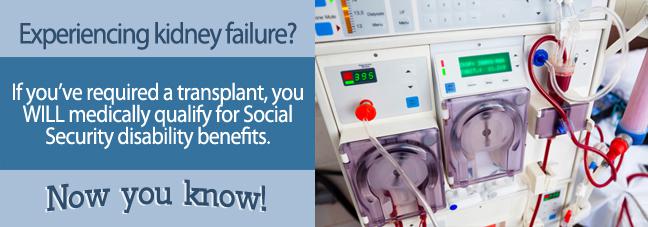As of 2017, kidney disease affects almost 31 million Americans. Because kidney function is so vital to keeping the body working normally, many people with advanced stage kidney disease find it difficult to work and live independently. And yet, some find that their initial disability claims do not get approval. But why?
Potential Problems When Applying with Kidney Disease
Kidney disease is a very complex disorder. In fact, is one of the only non-cancer disorders to be broken into distinct stages when describing its effects on the body. In the Social Security Blue Book (which lists all severe qualifying disabilities) it is also one of the only disorders to have multiple listings. This means that there are a variety of way to qualify for kidney disease (and a variety of ways that you can miss important details.)
Based on these entries, your claim was most likely denied due to one of the following reasons:
1. Your kidney disease has not caused sufficient impairment for long enough. For example, say your kidney disease grew severe enough that your kidney filtration rate was far below average, qualifying you under Blue Book Section 6.05. However, your filtration numbers were not found on at least two occasions at least 90 days apart during a consecutive 12-month period, meaning you didn’t yet qualify when you applied. This may also be the case if you were hospitalized at least three times due to your kidney disease, but these hospitalizations didn’t last long enough (at least 48 hours each) or did not take place at least 30 days apart.

2. Your tests did not adequately show the side effects of your kidney disease. For instance, to qualify under Section 6.05, applicants must show low glomerular filtration levels at least twice in a twelve month period, as well as displaying at least one of the following:
- renal osteodystrophy,
- peripheral neuropathy,
- fluid overload syndrome, or
- anorexia.
If at least one of these is not proven, then it is possible you may have been denied under section 6.05.
Preparing for Your Disability Hearing
Do not be discouraged if your initial kidney disease disability application was denied. In fact, 60-65% of all applicants receive the exact same verdict as you did. Moving forward, the next best step to take is to schedule a court hearing with an administrative law judge. ALJ hearings give you the chance to explain your case in person, while giving a judge the chance to reverse your case decision and start getting you benefits.
These hearings can be scheduled at your nearest Office of Disability Adjudication and Review (ODAR). Even if you aren’t entirely ready, it is best to schedule your appointment as quickly as you can, since there is normally a rather long waiting list.
Some of the best things you can do to prepare for your hearing include:
- comparing your initial application to the Blue Book’s kidney disease listings to see what else you might need
- getting new medical tests (and redoing old ones)
- compiling additional medication lists and hospitalization history
- getting statements from old bosses, coworkers, or loved ones that can testify to the effect your kidney disease has on your life
Considering a Disability Attorney
Few resources are more beneficial in an ALJ hearing like a disability attorney. They can help you to compile a strong case, stay in contact with the SSA (potentially speeding up the process), and fight on your behalf to get you the benefits you deserve. Even better, consultations and service is free unless your attorney wins you your case.